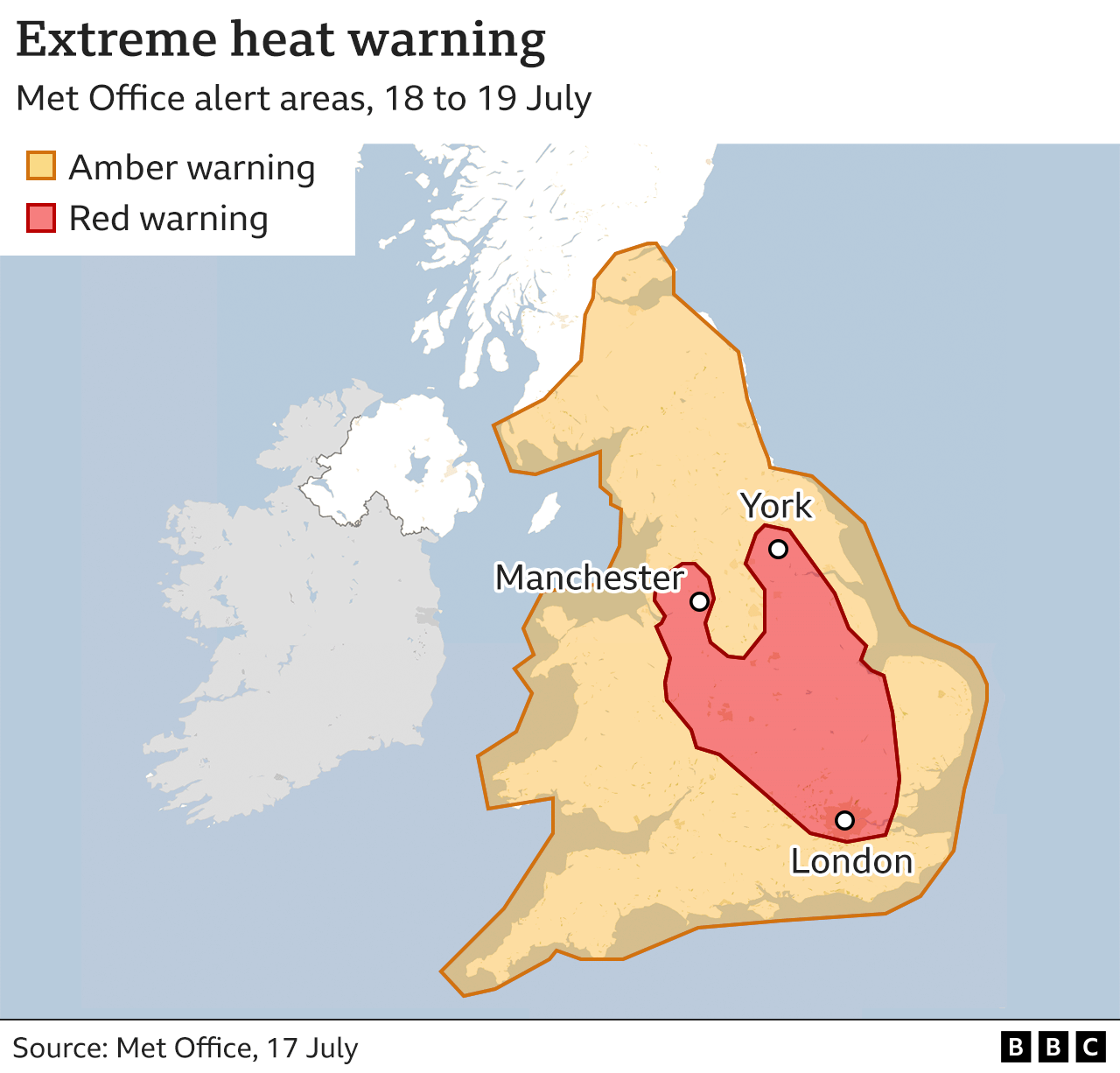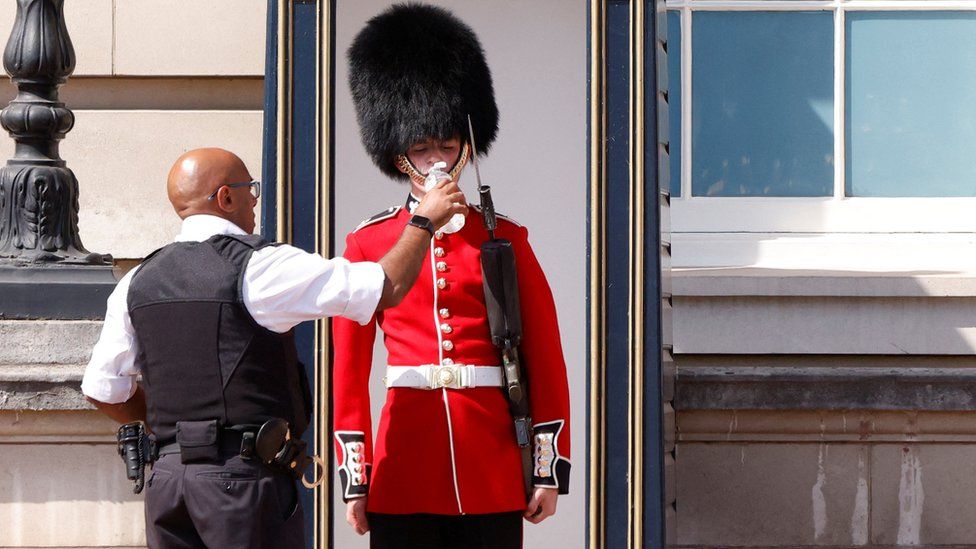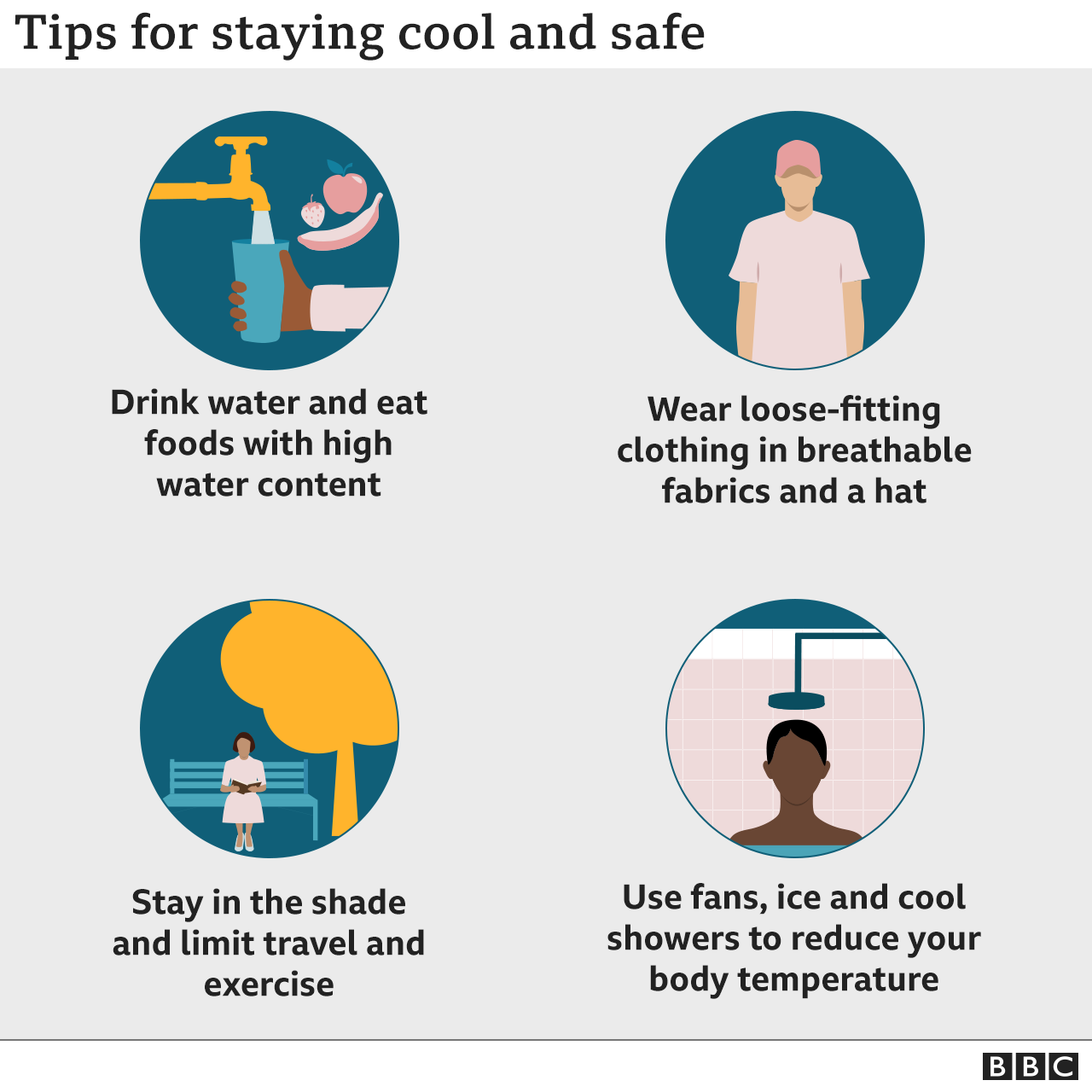The UK experiences its hottest day of the year as 38C is exceeded in parts of south-east England.
This video can not be played
To play this video you need to enable JavaScript in your browser.
The UK could have its hottest day on record this week, with temperatures forecast to hit up to 41C (106F).
At 16:00 BST it was 38.1C in Santon Downham, Suffolk, making this the hottest day of the year so far after temperatures rose through the day.
The Met Office has issued a red extreme heat warning on Monday and Tuesday in much of England, from London and the South East up to York and Manchester.
The current highest temperature in the UK is 38.7C, in Cambridge in 2019.
The hottest day on record has already been reached in Wales – with Hawarden in Flintshire hitting 37.1C, according to provisional figures from the Met Office.
Scotland and Northern Ireland are also experiencing their warmest days of the year so far with 30.5C recorded in Edinburgh Royal Botanic Garden, and 30.5C in Armagh, County Armagh.
Temperatures above 37C have been recorded in London, Cambridge, Surrey and Suffolk on Monday.
Amber warnings are in place across England and Wales, and parts of Scotland.
Peak temperatures are expected on Tuesday afternoon, with Worksop, Nottinghamshire, forecast to see 41C by the Met Office.
It is the first time the Met Office has issued a red warning since the system was introduced last year.
It means “widespread impacts on people and infrastructure” are expected, with “substantial changes in working practices and daily routines” required.
Overnight temperatures could be in the mid-20s, before cooling on Wednesday.
This video can not be played
To play this video you need to enable JavaScript in your browser.
Some schools have closed early – or chose not to open at all – although the government has issued guidance designed to keep them open. One teaching union said most chose to stay open.
Network Rail said people should travel only “if absolutely necessary” on Monday and Tuesday, with some cancellations already announced, and speed restrictions in place across the network.
LNER will not run services between London and Leeds and York for much of Tuesday.
Jake Kelly from Network Rail explained precautions are being taken to mitigate the impact of the extreme temperatures, but the heat would place railway infrastructure under “exceptional stress”.
Road congestion dropped by up to 10% in London, Birmingham, Bristol and Glasgow on Monday morning, compared with the same time last week, data from satellite navigation firm Tom Tom showed.
The Ministry of Defence said aircraft were using alternative airfields after reports of the tarmac melting on the runway at RAF Brize Norton in Oxfordshire.
Flights have been delayed at Luton Airport, where – due to the high temperatures – a “surface defect” has been identified on the runway, the airport said.

Responding to claims the UK has seen worse heat – such as during the prolonged heatwave in 1976 – BBC Weather’s Simon King said the “dangerously high” expected temperatures were up to 10C above the extended heatwave and severe drought experienced then.
Alongside the Met Office’s red and amber warnings, the UK Health Security Agency has issued a level four warning for England, which the government is treating as a “national emergency”.
The extreme heat has also put pressure on the NHS but Health Secretary Steve Barclay said the government was “closely monitoring the situation”, with additional resources in place, although he said the “highest point of concern” was on Tuesday afternoon.
Cabinet Office minister Kit Malthouse rejected criticism of Boris Johnson for not attending Cobra meetings on the heatwave, saying he had briefed the prime minister and it was his job to co-ordinate the response across the government.
Soaring temperatures are also having a devastating impact on much of Europe and north Africa, with authorities in western France warning of a “heat apocalypse” in 15 regions.
Wildfires have been wildfires raging from Greece to Morocco, with thousands being evacuated from and more than 1,000 deaths have been attributed to the heat in Portugal and Spain in recent days.


The heatwave is happening when average world temperatures have risen by just over 1C from their pre-industrial levels.
We are living in the hottest period for 125,000 years, according to the UN’s climate science body, the Intergovernmental Panel on Climate Change (IPCC).
We know what is behind this – greenhouse gas emissions caused by our burning of fossil fuels like coal and gas. Concentrations of carbon dioxide (CO2) in the atmosphere are at the highest level for two million years and rising, according to the IPCC.
If all the promises governments made at the UN COP26 climate conference in Glasgow last year are actually implemented then we’re looking at temperatures rising by 2.4C by the end of the century.
But the bad news is that emissions of CO2 continue to increase. Without big cuts by 2030 we could see temperatures go even higher. Perhaps as much as 4C by the end of the century, scientists predict.
What does that mean? I think you know the answer to that. It means more frequent and intense heatwaves like this.
Read more here.

People have been warned to take care if they cool off in water, with several deaths reported over the weekend – including a 16-year-old boy swimming in Salford Quays on Saturday evening and a 13-year-old boy who went missing in the River Tyne in Northumberland on Sunday.
On Monday a 16-year-old boy died after getting into difficulty in Maidenhead, Berkshire, Thames Valley Police said.
Water companies in southern and eastern England have warned increased demand is leading to low pressure – and even interrupted supply – for some households.

Image source, Reuters
Experts have urged people to drink water, keep their curtains closed where possible, and to check on friends and relatives.
“In this country we’re used to treating a hot spell as a chance to go and play in in the sun,” said Prof Penny Endersby, Met Office chief executive. “This is not that sort of weather.”
While there is no warning in place for Northern Ireland, temperatures are predicted to reach 30C on Monday.

More on the heatwave

Some attractions and businesses have closed or adapted their opening hours due to the heat.
Chester Zoo will stay shut during the heatwave to keep its animals, visitors, staff and plants safe, while pigs are being covered suncream as a precaution at the UK’s biggest agricultural show in Wales.
Battersea Dogs and Cats Home has advised people not to walk their dogs during the heatwave, saying pet owners should focus on mental stimulation rather than physical exercise.
This video can not be played
To play this video you need to enable JavaScript in your browser.
Food delivery firm Just Eat said it had suspended deliveries in areas badly hit by the heatwave on Monday and Tuesday, while some pub and restaurant kitchens have been closed.
The Victoria and Albert museum has closed some galleries, while the British Museum said it will close entirely from 15:00 on Monday and Tuesday for safety reasons after one union described it as “dangerously hot inside”.
Heatwaves have become more frequent, more intense, and last longer because of human-induced climate change – nine of the hottest days on record in the UK have happened since 1990.
The world has already warmed by about 1.1C since the industrial era began and temperatures will keep rising unless governments around the world make steep cuts to emissions.


How are you coping with the hot weather? You can get in touch by emailing haveyoursay@bbc.co.uk.
Please include a contact number if you are willing to speak to a BBC journalist. You can also get in touch in the following ways:
- WhatsApp: +44 7756 165803
- Tweet: @BBC_HaveYourSay
- Upload your pictures/video here
- Or fill out the form below
- Please read our terms & conditions and privacy policy
If you are reading this page and can’t see the form you will need to visit the mobile version of the BBC website to submit your question or comment or you can email us at HaveYourSay@bbc.co.uk. Please include your name, age and location with any submission.
